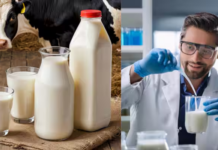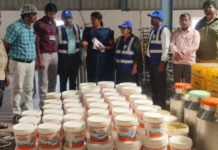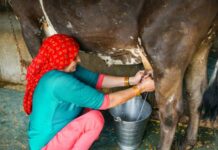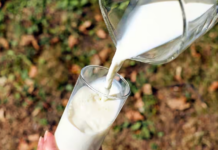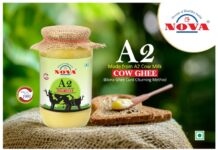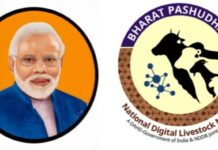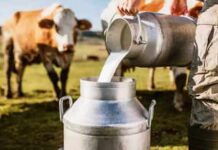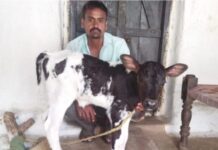New Delhi, June 25, 2021: Dairy giant Amul has enlisted the services of bovine deities in a bid to tell off non-profit entities that are seeking to promote “plant-based beverages” as alternatives to milk in India over charges of animal cruelty in the dairy industry.
Highlighting the cultural and spiritual significance of dairy in India, the Gujarat Cooperative Milk Marketing Federation, which oversees the Amul brand, published an advertisement in major English dailies Tuesday to present “facts” that will “bust the myths”.
In the ad, Amul said milk has been an integral part of Indian lives since the Harappan civilisation from 4,500 years ago. It pointed out that the Hindu deity, Lord Krishna, the caretaker of the holy cow, was a well-known “milkman of India”.
Cows are worshipped in India, the ad said, naming bovine deities like ‘Kamdhenu’, ‘Surabhi’, ‘Goumata’ and ‘Nandini’. So, farmers can’t treat bovines with cruelty to yield milk for human consumption, it pointed out.
It also noted that milk is a completely natural superfood, and vegetarian, while plant-based beverages contain additives like stabilisers and thickening agents, and also cost six times more.
Speaking to ThePrint on this, Amul Managing Director R.S. Sodhi said there is “no scope” of animal cruelty in the country. “In India, cows are given names and treated as members of the family. They are given food before anyone in the family and are properly bathed and taken care of. There is no scope of cruelty with such behaviour,” said Sodhi.
The move comes nearly a month after the NGO, the People for the Ethical Treatment of Animals (PETA) asked Amul to switch to producing vegan milk. The animal body told the Indian giant in a letter, “If you can’t beat them, join them”, pointing to the rising interest in “vegan milk”.
‘False image of Indian dairy’
According to Sodhi, dairy is a related ecosystem in India, with the “Rs 8 lakh crore industry” supporting the rural landscape. He claimed if they shift to plant-based beverages, it will instead be worth “Rs 24 lakh crore”, with most of it being “imported”.
“If we move away from dairy milk, what will landless farmers feed their children, and from where will we get our required biofertiliser? Milk is the most affordable and natural nutrition for 1.35 billion Indians,” he said, adding that the country produces 200 million metric tonnes of milk.
On claims that animals don’t drink milk from other animals, Sodhi pointed out that dogs and cats, which are popularly used as pets, drink milk.
“We are not against vegan or plant-based beverages but they should not do it by denigrating the Indian dairy industry. They give no scientific evidence to prove how it is better than dairy,” he said.
Other experts in the sector also agreed with these views, pointing to an alleged conspiracy according to the reports published in theprint.in.
“These foreign NGOs aren’t familiar with established Indian beliefs and practices. They are targeting dairy at the behest of MNCs for their business profits. They are set to destroy a deeply rooted formidable dairy and livestock rearing industry in India,” said Guru Prasad Singh, a professor in the animal husbandry and dairy department in the Banaras Hindu University.
“We are the largest milk producers in the world without any massive capital investment, which irks them,” said Singh.
“They are propagating a false image of Indian dairy… This is all a collective effort to dismantle the huge unorganised sector of milk and dairy in India to pave the way for foreign companies,” he said, noting that there is massive cruelty in the poultry industry but there is never a peep on that.
The conflict
The slugfest over vegan milk owes its origins to a notification issued by the food regulator, Food Safety and Standards Authority of India (FSSAI), in August 2020, proposing to stop the use of the word ‘milk’ for beverage products derived from almond, soya, rice, and oats.
This led to an Amul campaign this year busting myths of “plant-based beverages”. In response, PETA, and two other bodies, Beauty Without Cruelty, and Sharan India, petitioned the Advertising Standards Council of India against the campaign. The plea was dismissed in May.
PETA then wrote the letter mentioned above, asking for Amul to switch to vegan milk — an idea that Sodhi summarily rejected. Moreover, the dairy cooperative’s vice-chairman urged Prime Minister Narendra Modi to ban PETA for maligning the industry’s image in a larger “foreign conspiracy”.
Sarvesh Pande, co-founder and director at bovine NGO DearCows said, “Cows are used for the circular economy in Indian agriculture… If we move towards plant-based substitutes, almond milk will be imported from the US, where this PETA comes from, depriving support to Indian agriculture.”
He added, “Almonds will be imported in shiploads, these almond cultivation processes kill thousands of bees… PETA brings animal campaigns to India but doesn’t bring any support system to care for animal rights.”
Many companies in India like Sofit, Epigamia and Urban Platter have started vegan alternatives to milk but they are much smaller compared to the dairy sector. However, these companies have gained significant urban footing despite being costly. An Amul milk tetra pack costs Rs 50/litre, while Sofit soya milk is over Rs 140/litre.
The Indian dairy alternative market stood at $20.9 million in 2018 and is projected to grow at a CAGR of 20.7 per cent to reach $63.9 million by 2024, on account of increasing participation of youth in fitness activities, and growing consumer inclination towards low fat milk beverages.



